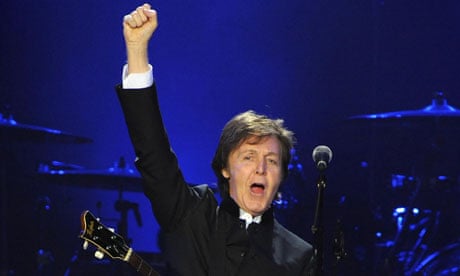On 18 June this year, Paul McCartney will turn 70. "There's a little cell in my brain that's never going to believe that," he says in the latest issue of Rolling Stone magazine, though there are signs of the burdens of old age starting to arrive. Certainly, he has finally quit smoking what some still call jazz tobacco, apparently because of the demands of raising his eight-year-old daughter. "Your sense of responsibility does kick in, if you're lucky, at some point," he reckons.
The avowedly clean-living Ringo Starr will soon be 72. Bob Dylan is 71. Further down the age range, John Lydon, aka Johnny Rotten, has just celebrated his 56th birthday – which makes him old enough (just) to be George Osborne's dad. Even the Britpop generation is now greying fast: when Blur performs at tomorrow night's Brit awards, the drums will be played by Dave Rowntree – who, at 47, is two years older than the prime minister.
All of which proves two things: that rock music and the culture it spawned are getting on a bit; and that anyone who can convincingly call themselves young will want nothing to do with either. In the face of mounting evidence, I remain a firm believer that the electric guitar is the embodiment of excitement and the four-piece band as close to the Platonic ideal of the gang as anyone has ever managed. But these illusions are now largely confined to those of us over 40, while the young understandably seek their musical thrills elsewhere.
If you want an idea of where pop music has arrived, go straight to the inescapable Ed Sheeran (21). The extent to which he draws on hip-hop points up the quarter-century reign of rap culture. Look at his chosen instrument: if there are guitars around, they now tend to be acoustic. And there's not just him: more proof that solo artists – Dizzee Rascal, Florence Welch et al – are the modern norm, while the last young British band with the power to shape the culture were Arctic Monkeys, who arrived seven long years ago. As far as the singles charts are concerned, all the key elements of rock'n'roll have been retired: at the time of writing, there was not a single song that would deserve that label in the top 40.
"Rock is dead – deo gratias," wrote one Guardian online reader over the weekend, reflecting a very common assumption. But that's wrong: in fact, the music is alive, and packing people in – it's just that it's finally settled in on the wrong (no, the right side) of the generation gap. According to the latest figures, the biggest selling British music magazine is now the cerebral and luxurious Mojo, whose last cover star was 77-year-old Leonard Cohen. I read it, and write for it: it speaks as powerfully to me as the NME did when I was 22.
As all this happens themes of age and experience are finally entering the music. Grinderman, the project led by the Australian singer Nick Cave (54), was purposely created as an outlet for the angst of advancing years, as evidenced by the charmingly titled No Pussy Blues: "I changed the sheets on my bed / I combed the hairs across my head / I sucked in my gut / And still she said / That she just didn't want to." The impressive new single by Paul Weller (53) is called That Dangerous Age, and opens thus: "When he wakes up in the morning / It takes him time to adjust." Less cartoonishly, when I watched the eternally great Sinead O'Connor (45) perform a new single called The Wolf Is Getting Married on Graham Norton's show, I wasn't looking for the perspective of a twentysomething: she was singing about craving security, and there was something in the midst of it all that was worldly, and overwhelmingly mature. From PJ Harvey to a Dylan who wheezes and croaks his insights, this is what the best rock music is now – stuff by and for the ageing and old.
There is only one problem: the tendency of too many rock'n'rollers to stick to their old hits and try to approximate their younger selves, lately made worse by all those reunions. On the live stage this is what McCartney does – but given that the Beatles sent my childhood self word of what adulthood might be like, it would be nice if he could update the same trick. As an expression of the 50-plus condition, sappy collections of pre-rock standards like his current album Kisses on the Bottom won't do: put simply, I'd like him to tell me, at length, what it's like entering your 70s. He has form on this score, as evidenced by a very underrated song from 2001, From a Lover to a Friend, which evokes the loss of his first wife Linda: a real wonder, full of fragility, self-doubt and intimations of mortality.
In his Rolling Stone interview, McCartney is asked about where he stands relative to younger musicians. "You get the argument 'make way for the young kids'," he says. "And you think, 'fuck that, let them make way for themselves.'" By way of indicating who he thinks "the young kids" are, he then mentions the Foo Fighters – who have an average age of 43.6, and a guitarist who's 52.
Last week the genuine article was lurking on Twitter, where people responded to his performance at the Grammys. "Wait, who is Paul McCartney?" asked one tweeter, though the reply was even better: "To be honest, I have no idea."

